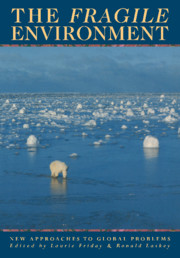Preface
Published online by Cambridge University Press: 03 May 2010
Summary
All living organisms interact with their environments. They are influenced by a host of environmental factors and, to some extent, they modify their environment. The human species is no exception. We respond to patterns of temperature, rainfall, abundance of food and other resources and to the incidence of competitors, predators and disease. However, the relationship of mankind with the environment is unique. The extent and degree to which quite small populations can modify the environment is unparalleled, and this combines with the success of the species to make an overwhelming impact.
Although the environment has some intrinsic resilience to deleterious change, the rate of growth of the human population is such that its environmental effects are far outstripping the recovery potential of the earth. As the population continues to grow at an ever-increasing rate, so the capacity of the earth to support life is being eroded: reports of famine, deforestation, loss of plant and animal species, soil erosion and atmospheric pollution are becoming all too familiar.
However, for the first time in history we are in a position to begin to evaluate our many and complex relationships with our environment and to attempt to tackle the deleterious consequences of our activities. Major new initiatives among all disciplines concerned with the environment are beginning to get under way, with the aim of understanding the workings of the biosphere, and particularly man's effects upon it.
Many of the problems associated with overexploitation of the environment are multinational in origin and are consequently very difficult to resolve.
- Type
- Chapter
- Information
- The Fragile EnvironmentThe Darwin College Lectures, pp. ix - xPublisher: Cambridge University PressPrint publication year: 1989

